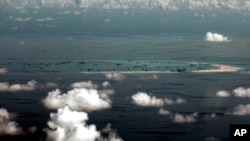Vietnam's social network users have welcomed a plan to establish an informal naval coalition led by the United States, expressing hope it will contain China's expansion in the South China Sea.
The chief of the U.S. Pacific Command, Admiral Harry B. Harris Jr., proposed last week to join the navies of Japan, Australia and India in preserving freedom of navigation in contested waters.
The call was made as China expands land reclamation efforts in an assertive push that worries Vietnam, one of the South China Sea's maritime claimants.
Social media user Vo Tan Hung told VOA's Vietnamese service that Beijing "must reconsider its aggressive moves in the contested waters if the coalition is born."
Some go further by likening members of the prospective naval quartet to "quadrilateral pillars," a reference to the four top jobs in Vietnam's political system.
Earlier plan
Japan, which disputes Beijing's role in the East China Sea, floated a similar proposal in 2007, but the idea was dropped in the face of Chinese protest.
While Australia is reportedly considering Harris' idea, the positions of India and Japan are unclear.
Responding to the suggestion, Chinese Foreign Ministry spokesman Hong Lei said Beijing had "no objection to normal exchanges and cooperation between relevant countries, but such cooperation shall not target a third party."
Meanwhile, Duong Danh Dy, an expert on China-Vietnam relations, said the birth of the group "will benefit Vietnam."
"Beijing cannot disregard its smaller neighbors like Vietnam in the presence of regional powers," he said. "China cannot do whatever it wants."
While top Vietnamese officials say they are sticking to their foreign policy of not siding with other countries to counter any third nation, the Southeast Asian country has been strengthening defense ties with a number of countries, including the Philippines, which is among the most vocal claimants to the disputed waters.
After the USS Curtis Wilbur, an American destroyer, sailed near an island controlled by Beijing, but also claimed by Vietnam and Taiwan, Vietnam's Foreign Ministry issued a statement saying Hanoi respected "innocent passage" of ships through territorial waters in accordance with international law. Some observers said Hanoi's statement appeared to support regional freedom-of-navigation exercises by its former foe.
More military spending
Apart from expanding its relations with world powers, Vietnam has also boosted military spending, becoming the world's eighth-largest arms importer from 2011 to 2015, according to a recent report published by the Stockholm-based International Peace Research Institute.
Tran Bang, veteran of the Sino-Vietnam border war, said the move shows Vietnam's clear awareness of its foreign threats, China in particular.
"Beefing up defense capability is necessary for Vietnam to defend itself," Bang said. "It is right to do so as its giant neighbor [is] ready to make aggressive moves at any time."
In related news, Vietnam opened Cam Ranh, its strategic port facing the South China Sea, on Tuesday, with President Truong Tan Sang saying it "would play a part in stabilizing regional peace."
Two Japanese warships are expected to make a port call there after escorting a submarine in a visit to the Philippines next month, Vietnamese media reported. Tokyo and Hanoi agreed last year to conduct their first ever joint naval exercise.
This report was produced in collaboration with VOA's Vietnamese service.





